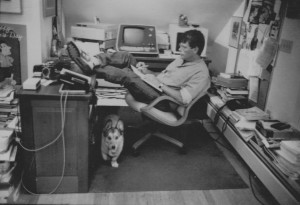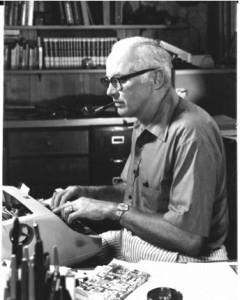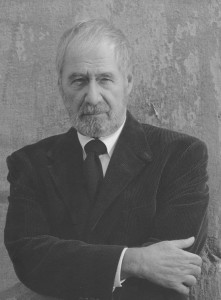It takes courage to write.
Not the kind of courage that a soldier displays going into battle, or a firefighter reveals charging into a burning building. That’s elevated courage, the kind that deserves to be honored in our culture. I’m not getting anywhere near to describing that kind of guts.
I’m talking about the non-lethal world, where it takes a degree of courage to do almost anything worth doing. Because for every enterprise of note there are critics and doubters, scoffers and jeerers, ready to pour acid rain on your parade.
It takes courage to write because obstacles and doubts come in many forms and build big brick walls to try to stop your progress.
Dick Simon (of Simon & Schuster) once said, “All writers are scared to death. Some simply hide it better than others.”
And what a couple of weeks it’s been for writers here on TKZ. We’ve had talks about the e-book tsunami and book price wars. We’ve chatted about branding and tried to figure out what makes readers buy books. We’ve had veteran writers sharing openly about their mistakes and the ramifications thereof.
And we all know the publishing business is in major shakeup mode right now. Trying to predict the future of the industry is sort of like trying to judge the family prospects of guests on Jerry Springer—can any relationship survive?
With all this going on, any writer – new or established – can start to wonder: Is the dream worth it? Do I have any chance of getting published? Staying published? Am I good enough? Am I a fraud? Are the odds too great?
Every true writer faces questions like this. And every true writer finds a way to dig down and write on.
Over a fifteen year writing career (twenty if you toss in the uncompensated beginnings) I’ve faced all the same doubts. Through trial and error I worked out a few ways to keep on keeping on. Maybe one of these will help next time you feel like throwing in the towel.
1. Think in terms of one more page. Don’t ponder the future or replay the past. Don’t stew about the industry or the myriad things you can’t control. Think about the work in front of you. Get that page done, then move on to the next. Establish a quota system and stick to it. The writing itself becomes the best way out of the bog of doubt.
2. Get some visual motivation. When I decided I was going to be a writer no matter what, I went out and bought a black coffee mug with Writer written in gold across it. A little corny, sure, but I didn’t care. I wanted to earn the right to be called a writer, and seeing the cup daily reminded me of the commitment I’d made.
In my office now I have pictures of three writers I admire.
The first is of Stephen King, in his home office, feet up on the desk, looking over a manuscript. He’s dressed casually. His dog is under his legs, looking at the camera.
This is my idea of the good life.
Then there’s a picture of John D. MacDonald, tapping away at his typewriter, pipe in mouth. He was prolific (his biography is entitled Red Hot Typewriter) and a master of story and style.
The photo reminds me to keep producing words.
Finally, I have a picture of Evan Hunter/Ed McBain, from the back of one of his novels, arms folded, staring out as if in challenge. He was even more prolific than MacDonald, writing both literary and genre novels.
If I’m not working hard enough, his glare reminds me to get going again.
3. Go to a bookstore and browse. Look at author photos and dust jackets. See what’s come out lately. If you can, make it an independent bookstore, and buy a book from them. They are folks who love books and are struggling mightily right now. Show a little support, then go back to your keyboard and write.
4. Re-read some favorites. I have a shelf of novels I especially love. Sometimes I’ll take one down at random and start reading. I get inspired again with the pure joy of what writing can be. Then I try to make some magic happen on my own page.
5. Remember what Satchel Paige once said: “Don’t look back. Something may be gaining on you.”
What about you? What are your favorite ways to keep going? Or are you a writer who has no doubts at all?




All great advice, Jim. I have that same shelf of favorites, too. And sometimes I’ll just grab one, open to any page, and read for awhile. The words inspired me once, they can do it again.
My dad often said, “Don’t worry about the things you can’t control.” I can control my words. Everything else is noise.
Jim, your advice about focusing on one more page is extremely good. That’s how I got myself through two of my three most recent books: No matter what, I just had to make it to the next page, even if only by one line! It helped keep me going. On the third book I lapsed on that discipline, and ran into a deadline crisis.
Fishing is my latest self-encouragement to write, Jim. I’ve scheduled my writing calendar to include one day of fishing in the Idaho mountains every two weeks. There, I get re-energized by going over in my mind what I need to do next on this path of writing and going over what I’m currently putting down on paper. I might even get a fish out of the deal.
Thanks for these words of encouragement, Jim. I’ll add these motivators to my list.
I’m definitely a goal-person. I always have either a word, or a time, goal(if I’m editing) for each day. I keep it small, and it helps – and it doesn’t stop me from going beyond it either.
I have a feeling that if you’re a writer that has no doubts, then you’re probably dead. I think anybody that is actually trying to make it, whether by writing or some other thing close to your heart, has doubts about their ability to produce quality stuff that somebody else will want or doubts about their ability to cope with whatever consequences occur (good or bad). Just make sure you have a least one really close friend that you can go to and cry on their shoulder or yell in their ear (whichever mood is happening!) I’ve found that makes life much more bearable and enjoyable. Thank goodness for great friends!
Excellent advice, Jim. Especially about grinding out that next page. So often that will be the key that opens the floodgates.
And I loved the photos!
Joe, wouldn’t people of any stripe be a lot happier if they followed your dad’s advice?
I like that, Kathryn, about even one line. Sometimes that’s enough!
Mark, there’s something to your method (i.e., it’s not madness). Giving the writer’s brain a refreshing rest like that is good for the “boys in the basement.” And fish is good for a brain anyway. Win – win.
Joanne, goal setting is one of the best habits to have, so well done. Keep going.
Yeah, Mike, I love those photos. I look at them each day before I write.
Great post James. No sense bitchin’ because nobody wants to hear it. get in there and do it, or don’t bother…
Jim, I realized that I stopped writing when I started worrying about selling. I’ve decided that the sheer joy of putting a story on a page is far more stimulus than a few dollars in the bank. You can’t write for dollars, you have to write from the heart.
Anon, that’s a crucial point. I have been thinking about that lately, and want to blog about it soon. Thanks.
There are books that inspire me and then there are books that make me think, “I’ll never write that well. Why am I even bothering?” But those too, are inspirational in their own way.
And your “one more page” comment reminds me of an old joke I use when I describe how I go about writing a 300 page novel:
How do you eat an elephant?
One bite at a time.
“Write on” bothers and sisters!
Uncannily, I share many of these same motivating methods. Bookstore browsing does it for me every time. And I do practice the others, too…except the photos. I don’t want Ed McBain glaring at me. 🙂 Instead, I look over illustrations/covers to my earlier work and I say: wow, I caused that artist to create something amazing…and it reminds me that this is what writing always accomplishes in the reader’s imagination, too. I write for the reader, not just the next page, and while I don’t know how wide my readership is, I do know there is at least someone out there waiting for my next one. Which is a long-winded way of saying that “the next page” is for them.
Good, thoughtful, positive article. Thank you!
Thanks for this encouraging post!
Great post! But I think the thing that encouraged me the most was seeing Stephen King’s desk. He’s messy! Like me! If it works for him, why not for me? heh heh
I love the pictures!
This was a great time to read this post as I’m in the wait-and-see period with future contracts depending on my sales numbers. 🙂
I should just keep writing!
This is excellent. I’m going to tweet a link to it for my writing friends.
I loved seeing your posters! You had me chuckling aloud. my husband just bought me your book, “The Art of War for Writers,” and I noticed your tweet in my stream and here I am.
These are words I needed to hear today. The advice is good. But more than that I needed to be reminded that the way I feel today is part of the process . . . and to laugh a little.
And yes, focusing on one more page really works. Actually, I just do “one more paragraph” and usually I’m off and running.
I’ve been trying to finish up my current WIP (I guess I spend too much time here it’s a killer-thriller and the first time I’ve ever done one). I am also going through and editing my first fully fleshed out novel (I’ve always written shorter stuff). It may sound strange- but sometimes I think I get so fixated on what I’m doing (at the one page at a time level) that I don’t always remember the big picture… then I go back and read some of what I wrote. It’s not perfect, it needs help, but it makes me smile and laugh and I think- hey, that’s not so bad, and I still really like it after a couple of rewrites….that gets me re-motivated and thinking- “Yes I can!”
Get busy writing, or get busy dying. Stephen King is one of my favorites, he makes me want to read, and write. Thanks for the great post…now on to one more page!
I’m wary of blanket statements about writers. I inevitably find that they’re untrue. Many writers, perhaps most, are plagued by doubt. But others are plagued by confidence. When they read their first draft, they believe it to be the best thing ever written in the history of literature. Because they don’t see what’s on the page; they see what was in their head when they were writing it.
Confidence can be as debilitating as doubt. Even when you see the flaws, you think, “But that’s okay. The reader will understand what I mean.” And then your critique partners point out the same flaws that you recognized on your own, and you wonder, “Why didn’t I fix that? A sentence, or a word, would have done the trick.”
I believe that confidence and fear are both a function of ego. People who doubt are afraid that they won’t live up to the high standards they’ve set for themselves (and they’re probably right).
But I try to write from a place of humility. I’m a vessel for the story, and my charge is to tell it as best I can. The key is to recognize that because I’m human and fallible, perfection is unattainable, and therefore should not be my goal. If readers are to relate to my story, then I must be willing to show my flaws. And once you recognize that being flawed is part of the job description, much of the fear melts away.